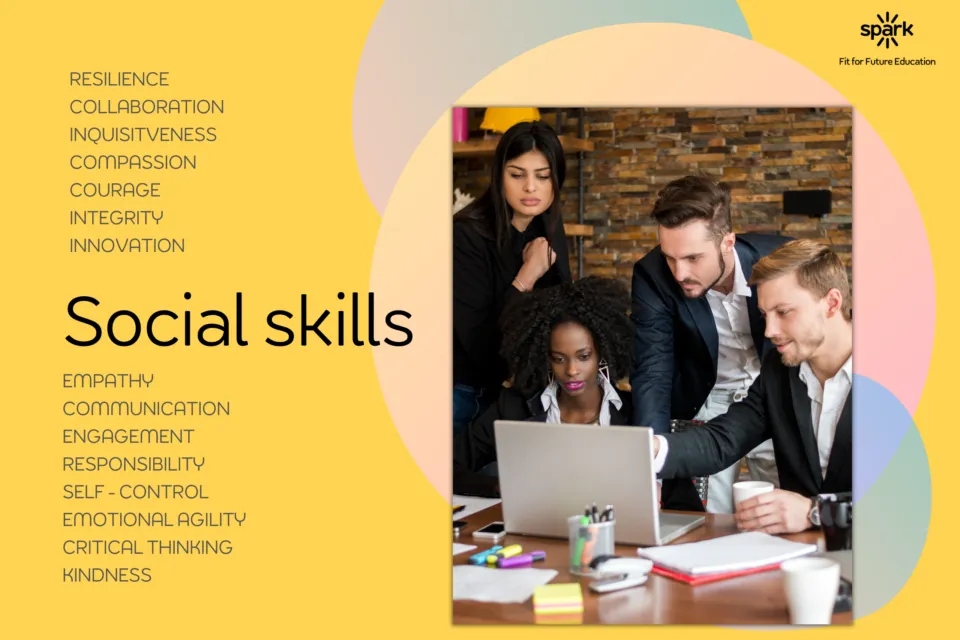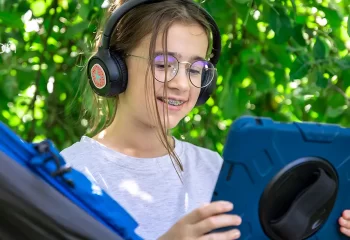A child’s ability to develop friendships, communicate with others and have playmates depends on many factors, which are the ones that grow in early childhood.
Learning to play and interact with others is a lifelong goal that starts in the early childhood years. Children’s social competencies are compatible with their academic skills, and they are the background and the essence of learning in the early childhood years.
We all communicate from birth in different ways. As we grow older, we feel the need to communicate and connect with others by exchanging different ideas and feelings verbally and non – verbally. Social skills are essential to get along with others, and this is why developing them in young children is a must.
Pandemic made us realize that families need to be taught and kept aware of children’s social behaviour.
Deepening family engagement in this regard is vital as children tend to stay more at home these days and do online courses. Teachers around each school should create closer bonds with families and help them by offering social and emotional development support.
Social skills are the life skills that help students in their personal and professional life along the way.
Fostering an environment where they can be taught, learned and developed is necessary, and we should not assume the school students already have them. As parents, as teachers, as caregivers, it is our job to make sure children receive the help and education they need in this regard.
Definition

Social skills are “socially acceptable learned behaviours that enable an individual to interact effectively with others and avoid or escape negative social interactions with others.” (Gresham & Elliot, 1990)
Social skills
There are many social skills, but some of the most important are:
- Communication
- Cooperation
- Assertion
- Responsibility
- Empathy
- Engagement
- Self – control
Each of the above help young children stay connected and have a positive social life. Having the right social skills help them understand social behaviours in others.
Some school focused social skills are:
- Listening to others
- Following directions
- Ignoring peer distractions
- Asking for help
- Having a conversation
- Cooperating
- Being able to control the temper
- Acting responsibly with others
- Showing kindness
Why are social skills important?
Helping children develop social skills in childhood and at a young age can influence their health, happiness and stability throughout their entire life. Teachers, parents and caregivers are the ones responsible for developing and enriching the kids’ social relationships.
A lack of social skills can put children in difficult situations. Some of them are situations where they cannot make new friends, they are not able to communicate effectively with unfamiliar individuals, do not understand social situations that may arise, have a low understanding of jokes and figurative language as well as when reading books and do not know how to cope with failure.
According to DiPerna & Elliot, 2002, social skills help students with their reading and mathematics achievements, influencing their motivation, engagement, and studying skills.
Having developed social skills help children to compete with other problem behaviours; they may be prone to have or meet others. It is essential to have a good development of the social skills to have both a positive attitude and to solve the conflicts that may arise – such as externalizing, bullying or hyperactivity.
Social skills help teenagers have better educational and career outcomes, better success in life and create stronger friendships.
As of today, antisocial behaviour is more contagious than kindness; promoting more socially desirable behaviours is a must. The online system for education can both help and harm. It depends a lot on the child, the parents, the teachers and tutors and the school.
Ways of improving social skills in young children
Recognizing that social learning and skills are cognitive academic qualities that begin to develop with early childhood helps us improve where needed and grow imperious. The primary way children pass on skills is through play, so making sure we do not take this from themselves is the beginning of their social skills development.
Curiosity is what helps children learn. They are born with inquisitiveness.
Inside the school, teachers can promote prosocial behaviour like gratitude, kindness, empathy by:
1. Having a class or some minutes of a class where you practice gratitude by asking students to take some notes on what they feel grateful for.
2. Encouraging kindness – the more we give compliments and praise, the more students act alike.
3. Creating a social interaction climate. Whether face to face or online, this is an excellent way for students to develop social skills, as they can see that each person can contribute with something new to the projects. Giving students tasks that mean relying on others to succeed will emphasize social interconnectedness.
4. Teaching empathy. Empathy must be modelled and taught. The best way to do this is to use personal experiences, as it will help students understand and recognize how other people feel in different situations. Empathy is one of the key characteristics a person with social skills should have.
5. Helping the students accept and display their emotions. They should understand what each emotion and feeling mean and that they are free to express them.
Spark School and social skills development in teenagers
Continuing your studies disregarding the situation of the pandemic is what each parent want for their children. While online teaching has become the best option for ongoing studies, we must also think of how impact has on our children’s social skills and behaviour.
Is online the place where they can learn and develop these skills? Where they can manage to express their emotions and feelings, and where they can develop compassion? And our answer as a hybrid school – that is mostly 85 % online is YES.
We help students develop their social skills and become fit for future.
We are there for our students.
At Spark, we teach them social skills and foster an environment where they can communicate with their global colleagues.
In this global community, distance doesn’t matter, and relationships can grow. At Spark School, empathy and compassion find their ways by choosing to contribute to today’s real-world problems.
Moreover, we support our students in their development and help them grow their born with social skills.
They feel safe in an environment that, apart from teaching them and challenging them to take on responsibilities, makes them see
– that kindness is normal.
– that practising gratitude with the environment is helpful for a healthy world.
– that being vulnerable and asking for help allows others to show their empathy.
– that we are all one.
As for the parents and tutors partnership, we make sure we have a close relationship with parents and think our programs and share our knowledge with them, to help them sustain positive social relations and skills at home.
Conclusion
More than ever, online is our go-to place for studying. Ensuring the curriculum helps students improve their social skills and allows them to interact with others is essential.
The quality of the setting in which young children spend most of their time, outside at home as well as at home is what matters for their wellbeing and development.
While some of the social skills emerge organically, benefiting from guidance is always a great opportunity. While offering guidance as parents and as teachers, be open about receiving some guidance from your child, into your own social skills development.




